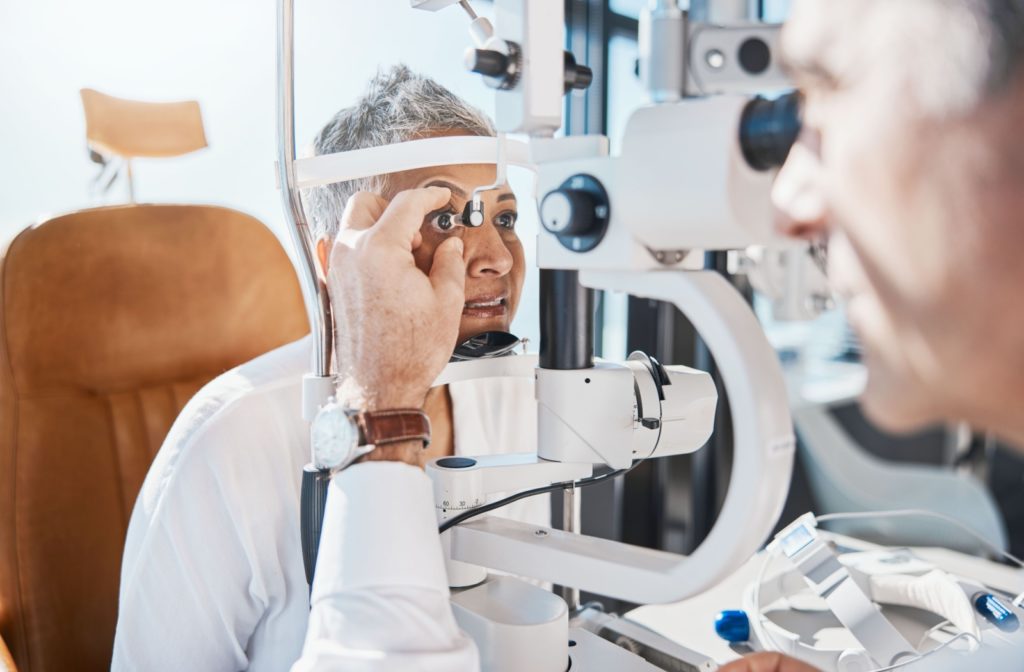Changes in light can impact our ability to see well.
During the day, cone cells in our retina help us perceive color and fine details. At night, due to reduced brightness, these cells become less effective. In lower light levels, rod cells detect the available light and help us see in darker settings but with less color and detail.
The transition between light and dark normally causes blurred and muted vision. It’s normal to have a little trouble seeing at night. However, if you have excessively poor night vision, consider visiting your eye doctor to determine the underlying cause.
Understanding Night Vision
When night falls, the reduced light changes our vision.
The human eye is naturally more adapted to daylight conditions, thanks to the abundance of light receptors called cones in our retinas. These cones are responsible for sharp, detailed color vision.
At night, however, our rod cells take over. Rods are more sensitive to low light, but they don’t provide color vision and have lower spatial acuity.
This shift from cone cells to rod cells makes it harder for us to have the same visual clarity at night as we do during daylight hours.
While it’s normal to have less visual acuity during nighttime, extreme difficulty seeing at night could be a result of other eye conditions or uncorrected refractive errors. Routine eye exams help detect any changes in your vision to preserve your eye health.
Make sure to visit your eye doctor if your night vision causes:
- Frequent squinting to try to see better
- Difficulty in adjusting from well-lit to dimly lit environments
- Increased anxiety driving at night due to unclear vision
It’s important to differentiate between general low vision and specific night vision issues. Low vision can mean difficulties in any lighting conditions, whereas night vision problems are distinct issues in low-light conditions.
Factors Influence Your Ability to See at Night
The rod cells in our eyes take on a major role in our ability to see clearly during nighttime. Rod cells, which do not manage color perception, give us less visual clarity during the evenings. But these cells are incredibly sensitive to light, helping us see in dim places.
However, environmental and ocular conditions can further impact how we see at night.
Environmental Factors
When we drive at night, our low-lighting visual skills become more important. The glare from oncoming headlights can be particularly obstructive, especially when they cause halos to appear.
This glare can cause temporary vision impairment, making it hard to see the road. Glare is irritating because it scatters light and creates a contrast that’s tough for our eyes to process quickly.
Plus, the level of street lighting can significantly impact night vision. Poorly lit areas make it more difficult to see obstacles or changes in terrain. On the other hand, overly bright street lamps can cause eye strain from excessive contrast.
Uncorrected Refractive Errors
Uncorrected refractive errors can significantly diminish our ability to see clearly, especially at night.
Presbyopia, which develops naturally as we grow older, leads to a decreased ability to focus on objects that are closeby. As the eye’s lens becomes less flexible, it can impact night vision. The difficulty in adjusting focal lengths can cause strain in dim lighting, making it hard for individuals to quickly shift their gaze from near to far or vice versa.
Myopia develops because the shape of the eye is too long, which means the light focuses in front of the retina instead of directly on it. Myopia makes distant objects appear blurry. In low light, myopia can make it difficult to detect objects and navigate through dark areas.
Astigmatism can distort vision at all distances, especially in low lighting. This refractive error is caused by an irregular curvature of the cornea or lens. The uneven focusing of light can lead to blurred or doubled images at all distances, creating additional challenges in visibility when driving at night.
The combination of these refractive errors can amplify the effects of glare and shadows, which are already problematic in dimly lit conditions.
Night Blindness
Night blindness, or nyctalopia, is a condition that impairs an individual’s ability to see in low-light or dark environments. It’s not a disease but rather a symptom of other underlying issues affecting the eyes.
Those with night blindness often experience difficulty adjusting to darkness, which can make it challenging to perform tasks such as driving at night or navigating dark rooms.
Night blindness can also be caused by factors such as severe vitamin A deficiency, which can lead to a dry cornea, damaging the cornea and the retina. Aging can also cause night blindness as iris muscles weaken, pupil size decreases, and rod cells age.

Anti-Reflective Glasses for Night Driving
Individuals with refractive errors can use corrective lenses to help them navigate low-light conditions.
One of the most effective ways to improve night vision, especially for driving, is with anti-reflective glasses.
These lenses are designed to reduce glare from headlights and streetlights. The special coating on these glasses allows more light to pass through to your eyes, enhancing visual clarity and reducing reflections that cause discomfort.
Anti-reflective eyeglasses can make a significant difference, particularly for those who drive frequently at night. By minimizing glare, these lenses help maintain focus and reduce eye strain, making nighttime navigation safer and more comfortable.
Anti-reflective lenses can also be purchased with no prescription for individuals who don’t require vision correction to see clearly.
Schedule an Appointment
Understanding the intricacies of how our vision changes at night can lead to safer and more enjoyable nocturnal activities. Anti-reflective glasses can help improve night driving conditions.
Connect with our team at Total Vision Del Mar to schedule an appointment for concerns about low-light vision.



